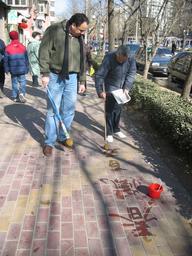
2004.02.16 Beijing, China

While leaving the apartment last Saturday I noticed a couple well-written characters barely visible in the dust on the sidewalk. I couldn't understand how they got there. They weren't painted or etched into the cement. They were just there, slowly fading. Looking around I spied one of the local business owners about to head back into his shop. He was clutching a small bucket and a huge brush, the latter pieced together from a mop handle and sponge.
Alongside the makeshift brush, he also held a book of classical poetry from which he had been copying characters. When Joyce asked if he wouldn't come back and continue, he modestly obliged. I was entranced: I'd never seen calligraphy done with anything larger than a brush held between the fingers. I'd certainly never seen it done without ink, using a dusty street as canvas.
The old man's calligraphy was beautiful. He was writing in the most common script, Kai-Shu. When I asked about Cao-Shu, a form of cursive that is so ornate it's often illegible, he proceeded to give several examples. He would first dip the sponge into the bucket of water, then swish it against the cement. After a second or two he would raise the brush to expose a beautiful, perfectly balanced character.
He asked how long I'd been in Beijing and handed me a second brush. I replied that I'd been in town for just over a month. I still can't communicate very well when speaking Chinese so I know it surprised him and several passers-by when I began moving the brush myself. I copied only three characters from one of the lines of poetry: chun (spring), you (to have), and wu (the number five). The last character actually came out fairly well and earned high praise from an old woman who was watching. I know that the attraction of my brush strokes was more novelty than talent. I'm sure that if it had been some schoolboy practicing on the street rather than a foreigner, nobody would have saw fit to comment. Still it was pleasing to receive encouragement and the whole affair had a positive, serendipitous feeling.
Saturday was also the first really clear, sunny day I'd experienced since arriving at the beginning of the year. People were enjoying being out on the street, rather than just hurrying along to get out of the cold. Previously I'd seen gatherings of men huddled around impromptu Chinese chess matches, but the day's warm weather seemed to bring out flocks of them. We found a cobbler at work next to one such gathering, another fortunate discovery: having my shoes re-soled was our original reason for going out.
That afternoon was spent at the China Puppet Theatre, a little ways further down the street. I'd passed by many times and had been curious to take in a show. We got tickets to a shadow-play performance which turned out to be for young children, though I still found it interesting. I think I'd only seen one shadow-play ever before, when I was very young: it's just not a common art form in the west. Monkeys, pigs, and other creatures came to life, swinging, and dancing behind an illuminated screen.
I don't know how much longer such shadow plays will survive as a common form of entertainment. It takes several men to manipulate all the shadow figures, with the more complicated animals each requiring multiple puppeteers. The children of the audience didn't seem terribly engaged until the "hands-on" experience after the show. The mothers generally seemed more inclined to take a nap than exhibit any interest in the performance. While such a show might have really been something a generation or two ago, most of the entertainment opportunities I see around Beijing today seem to be either watching pirated DVD's or singing karaoke.
I've adapted to an early-to-bed, early-to-rise routine. The past ten days or so I've got out of bed before 9:00 every morning, which is really something given my usual schedule. This was prompted by beginning my day at 6:00 P.M. one night a couple weeks back. I now make a point to get out of bed, pick up a newspaper, then drink a cup of coffee somewhere outside the apartment. No place nearby sells coffee, so I take a long walk to the Di Tan park. The McDonald's across from the west entrance is cheapest, at 4 RMB per cup. I balance the thought of regularly patronizing the great bastion of commercialism with the dim hope they are losing money on the three refills I help myself to.
I may be visiting Hong Kong over the first week of March. Cousin Tina is taking a sabbatical from her job and wants to visit while I'm in Asia. I told her I'd meet her anywhere in greater China if she can come before I formally begin at the college in Kashgar. She chose Hong Kong; should be a nice detour before the months in remote Xinjiang.